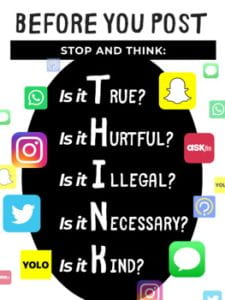Have you ever wondered if in the age of Social Media, your employers ever looked you up and if that affected you getting the job? Well, continue reading to find out!

Employers look at your social media profiles to find out anything they can about you before interviewing or hiring you. A 2022 Harris Poll found that 70% of employers in the survey would screen potential employees’ social media profiles before offering them a position. A Career Builder Poll found that 54% of employers ruled out a candidate due to discovering something they disagreed with on their social media profile.
Pre-employment background checks now go beyond criminal and public records and employment history. If hiring managers can’t find you online, there is an increased chance they will not move forward with your application. In fact, 21% of employers polled said they are not likely to consider a candidate who does not have a social media presence.
However, don’t fret; social media can also be why you get your next job. The Aberdeen Group found that 73% of job seekers between 18 and 34 obtained their last job through social media. People seeking employment have unlimited domains to find jobs on platforms such as Linkedin, Stackoverflow, GitHub, Facebook, TikTok, and other websites. A Career Builder survey found that 44% of hiring managers and employers have discovered content on a candidate’s social media profile that caused them to hire the candidate. Due to this change in hiring and recruitment, employers have to engage the newer generation in the job force through competitive social media advertisements. Job seekers and employers alike use their social media profiles for networking, sourcing, and building recognition.

Is social media a double-edged sword? If you have social media, it can lessen your chances of being employed. At the same time, many jobs are posted on social media, which can be why you get hired. You can use your social media, i.e., Linkedin, to promote yourself and stay active on the platform at least once a week. Employers are interested in how you use your social media.
Regarding Facebook, Instagram, and TikTok, keep them neutral and clean. Have your account private, and before you post a picture, ask yourself if you are comfortable with the CEO or your boss seeing that picture. If the answer is yes, go ahead and post; if you are unsure, the best bet is to not post it.

We walk a fine line in the great age of Social media; many do’s and don’t vary depending on your job and in what area. Someone working for Google would have a different social media presence and posts than someone working for the Prosecutor’s Office. You can always turn to your employee handbook once you are hired or ask HR to be on the safe side.
Harry Kazakian stated in an article for Forbes Magazine that he screens potential employees’ social media to eliminate potential risks. He does this to ensure employee harmony in the workplace. Specifically, Kazakian is looking to avoid candidates who post: constant negative content, patterns of overt anger, suggestions of violence, associations with questionable characters, signs of crass behavior, or even too many political posts.
Legally, employers may use social media to recruit candidates by advertising job openings or performing background checks to confirm that a job candidate or applicant is qualified. This allows employers to monitor your website activity, e-mail account, and instant messages. This right, however, cannot be used as a means of discrimination.
Half the states in the US have enacted laws that do not allow employers to access employees’ social media accounts. California prohibits employers from asking for social media passwords of their current or prospective employees. Maryland, Virginia, and Illinois offer protections to job seekers, so they do not have to divulge their social media passwords or provide account access. California, Illinois, New Jersey, and New York, among other states, have enacted laws prohibiting employers from discriminating based on an employee’s lawful off-duty conduct.
Federal laws prohibit employers from discriminating against a prospective or current employee based on information on the employee’s social media relating to their race, color, national origin, gender, age, disability, and immigration or citizenship status. Employees should be conscious of what information they display on social media websites. However, federal law prohibits companies of a specified size from illegally discriminating against their employees. Title VII, ADA, and GINA apply to private employers, educational institutions, and state and local governments with 15 or more employees. The ADEA applies to employers with 20 or more employees.
California, Colorado, Connecticut, Illinois, Minnesota, Nevada, New York, North Dakota, and Tennessee all have laws that prohibit employers from firing an employee for engaging in lawful activity, on the employer’s premises, during nonworking hours, even if this activity is not in direct conflict with the essential business-related interests of the employer, are unwelcome, objectionable, or not acceptable. However, the Courts in the states mentioned above will weigh the employee protections against an employer’s business interests. If the Court rules that the employer’s interests outweigh employee privacy concerns, the employer is exempt from the law. Be aware that some laws provide explicit exemptions for employers.
Legal risks based on Employment Discrimination, Title VII of the Civil Rights Act, the Age Discrimination in Employment Act, the Equal Pay Act, Title II of the Genetic Information Nondiscrimination Act, and the Equal Employment Opportunity Commission can occur when employers use social media to screen a job applicant. Section 8(a)(3) of the National Labor Relations Act prohibits discrimination against applicants based on union affiliation or support. Therefore, using social media to screen out applicants on this basis may lead to an unfair labor charge against the company.
A critical case decided in 2016, Hardin v. Dadlani, regarded a hiring manager who had previously preferred white female employees. The hiring manager instructed an employee to look up an applicant on Facebook and invite her for an interview “if she looks good.” The Court ruled that this statement made by the hiring manager can be reasonably construed to refer to her race, which can establish discriminatory animus. Discriminatory animus is when an employee may prove discrimination by either direct or circumstantial evidence. Direct evidence is evidence, if true, that proves the fact of discriminatory animus without inference or presumption. A single remark can show a discriminatory animus.
Be an intelligent job candidate by knowing your rights. Companies that use third-party social media background checks must comply with disclosure and authorization requirements since it is considered consumer reporting agency under the Fair Credit Reporting Act. Therefore, an employer must give notice to the prospective employee or current employee that they want to acquire a consumer report for employment purposes and obtain written consent from the prospective employee or existing employee.
Happy job hunting, and think before you post!


This post was really interesting and extremely relevant as 3Ls who are soon to be in the workplace. While the intersection of social media and the hiring process certainly has both pros and cons, I find the idea that employers could potentially use social media accounts to discriminate against prospective or current employees problematic. One major issue I see is there is too much uncertainty about how these social media screenings would be regulated to ensure no EEOC violations. For example, how would uniform and consistent social media account screenings be ensured? Or what is or isn’t a legitimate concern regarding a potential employee? While an employer certainly has an interest in how its company or firm is represented by its employees at some point, we have to draw the line between the workplace sphere and our personal life sphere.
One poll statistic that particularly stood out to me was the one citing 21% of employers as not likely to consider a candidate who does not have a social media presence. While social media can be telling about a person’s traits, personality, and character I didn’t anticipate an employer’s observance of a lack of social media to be a significant weight marker in the hiring process. Personally, I have been debating a social media cleanse, but this statistic makes me think twice about deactivating or deleting an account considering we will all be applying to jobs soon. Social media has obviously become very prevalent in many facets of our lives so it will be interesting to see how the use of social media in the workplace and hiring processes continues to evolve in the future.